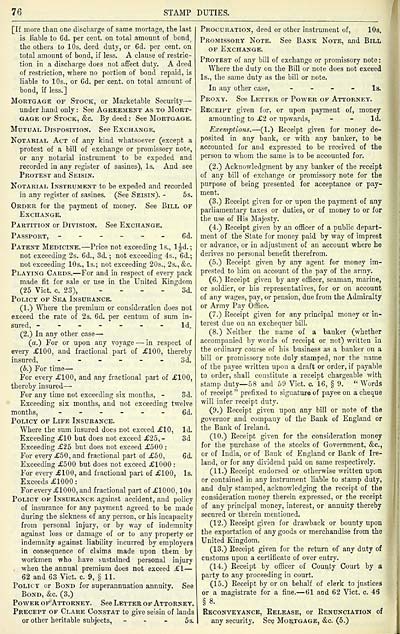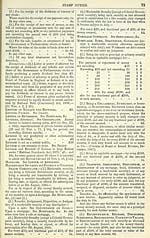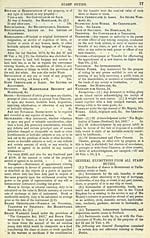Download files
Complete book:
Individual page:
Thumbnail gallery: Grid view | List view

76
STAMP DUTIES.
[If more than one discharge of same mortage, the last
is liable to 6d. per cent, on total amount of bond,
the others to 10s. deed duty, or 6d. per cent, on
total amount of bond, if less. A clause of restric-
tion in a discharge does not affect duty. A deed
of restriction, where no portion of bond repaid, is
liable to 10s., or 6d. per cent, on total amount of
bond, if less.]
Mortgage of Stock, or Marketable Security —
under hand only : See Agkeement as to Mort-
gage OF Stock, &c. By deed : See Mortgage.
Mutual Disposition. See Exchange.
Notarial Act of any kind whatsoever (except a
protest of a bill of exchange or promissory note,
or any notarial instrument to be expeded and
recorded in any register of sasines). Is. And see
Protest and Seisin.
Notarial Instrument to be expeded and recorded
in any register of sasines. (See Seisin). - 5s.
Order for the payment of money. See Bill of
Exchange.
Partition or Division. See Exchange.
Passport,
6d.
Patent Medicine. — Price not exceeding Is., Ijd. ;
not exceeding 2s. 6d., 3d. ; not exceeding 4s., 6d.;
not exceeding 10s., Is.; not exceeding 20s., 2s., &c.
Playing Cards. — For and in respect of every pack
made fit for sale or use in the United Kingdom
(25 Vict. c. 23), - - - - 3d.
Policy of Sea Insurance.
(1.) Where the premium or consideration does not
exceed the rate of 2s. 6d. per centum of sum in-
sured, ------- Id.
(2.) In any other case —
(a.) For or upon any voyage — in respect of
every £100, and fractional part of £100, thereby
insured, ------ 3d.
(b.) For time —
For every £100, and any fractional part of £100,
thereby insured —
For any time not exceeding six months, - 3d.
Exceeding six months, and not exceeding twelve
months, ------ 6d,
Policy of Life Insurance.
Where the sum insured does not exceed £10, Id.
Exceeding £10 but does not exceed £25,- 3d
Exceeding £25 but does not exceed £500 :
For every £50, and fractional part of £50, 6d.
Exceeding £500 but does not exceed £1000 :
For every £100, and fractional part of £100, Is.
Exceeds £1000 :
For every £1000, and fractional part of £1000, 10s
Policy of Insurance against accident, and policy
of insurance for any payment agreed to be made
during the sickness of any person, or his incapacity
from personal injury, or by way of indemnity
against loss or damage of or to any property or
indemnity against liability incurred by employers
in consequence of claims made upon them by
workmen who have tustained personal injury
. when the annual premium does not exceed £1 —
62 and 63 Vict. c. 9, § 11.
Policy or Bond for superannuation annuity. See
Bond, &c. (3.)
Power of Attorney. See Letter of Attorney.
Precept of Clare Constat to give seisin of lands
or other heritable subjects, - - - 5s.
Procuration, deed or other instrument of, 10s.
Promissory Note. See Bank Note, and Bill
of Exchange.
Protest of any bill of exchange or promissory note :
Where the duty on the Bill or note does not exceed
Is., the same duty as the bill or note.
In any other case, - - - - Is.
Proxy. See Letter or Power of Attorney.
Receipt given for, or upon payment of, money
amounting to £2 or upwards, - - Id.
Exemptions. — (1.) Receipt given for money de-
posited in any bank, or with any banker, to be
accounted for and expressed to be received of the
person to whom the same is to be accounted for.
(2.) Acknowledgment by any banker of the receipt
of any bill of exchange or promissory note for the
purpose of being presented for acceptance or pay-
ment.
(3.) Receipt given for or upon the payment of any
parliamentary taxes or duties, or of money to or for
the use of His Majesty.
(4.) Receipt given by an officer of a public depart-
ment of the State for money paid by way of imprest
or advance, or in adjustment of an account where he
derives no personal benefit therefrom.
(5.) Receipt given by any agent for money im-
prested to him on account of the pay of the army.
(6.) Receipt given by any officer, seaman, marine,
or soldier, or his representatives, for or on account
of any wages, pay, or pension, due from the Admiralty
or Army Pay Office.
(7.) Receipt given for any principal money or in-
terest due on an exchequer bill.
(8.) Neither the name of a banker (whether
accompanied by words of receipt or not) written in
the ordinary course of his business as a banker on a
bill or promissory note duly stamped, nor the name
of the payee written upon a draft or order, if payable
to order, shall constitute a receipt chargeable with
stamp duty— 58 and 59 Vict. c. 16, § 9. " Words
of receipt " prefixed to signature of payee on a cheque
will infer receipt duty.
(9.) Receipt given upon any bill or note of the
governor and company of the Bank of England or
the Bank of Ireland.
(10.) Receipt given for the consideration money
for the purchase of the stocks of Government, &c.,
or of India, or of Bank of England or Bank of Ire-
land, or for any dividend paid on same respectively.
(11.) Receipt endorsed or otherwise written upon
or contained in any instrument liable to stamp duty,
and duly stamped, acknowledging the receipt of the
consideration money therein expressed, or the receipt
of any principal money, interest, or annuity thereby
secured or therein mentioned.
(12.) Receipt given for drawback or bounty upon
the exportation of any goods or merchandise from the
United Kingdom.
(13.) Receipt given for the return of any duty of
customs upon a certificate of over entry.
(14.) Receipt by officer of County Court by a
party to any proceeding in court.
(15.) Receipt by or on behalf of clerk to justices
or a magistrate for a fine. — 61 and 62 Vict. c. 4S
§8.
Reconveyance, Release, or Renunciation of
any security. See Mortgage, &c. (5.)
STAMP DUTIES.
[If more than one discharge of same mortage, the last
is liable to 6d. per cent, on total amount of bond,
the others to 10s. deed duty, or 6d. per cent, on
total amount of bond, if less. A clause of restric-
tion in a discharge does not affect duty. A deed
of restriction, where no portion of bond repaid, is
liable to 10s., or 6d. per cent, on total amount of
bond, if less.]
Mortgage of Stock, or Marketable Security —
under hand only : See Agkeement as to Mort-
gage OF Stock, &c. By deed : See Mortgage.
Mutual Disposition. See Exchange.
Notarial Act of any kind whatsoever (except a
protest of a bill of exchange or promissory note,
or any notarial instrument to be expeded and
recorded in any register of sasines). Is. And see
Protest and Seisin.
Notarial Instrument to be expeded and recorded
in any register of sasines. (See Seisin). - 5s.
Order for the payment of money. See Bill of
Exchange.
Partition or Division. See Exchange.
Passport,
6d.
Patent Medicine. — Price not exceeding Is., Ijd. ;
not exceeding 2s. 6d., 3d. ; not exceeding 4s., 6d.;
not exceeding 10s., Is.; not exceeding 20s., 2s., &c.
Playing Cards. — For and in respect of every pack
made fit for sale or use in the United Kingdom
(25 Vict. c. 23), - - - - 3d.
Policy of Sea Insurance.
(1.) Where the premium or consideration does not
exceed the rate of 2s. 6d. per centum of sum in-
sured, ------- Id.
(2.) In any other case —
(a.) For or upon any voyage — in respect of
every £100, and fractional part of £100, thereby
insured, ------ 3d.
(b.) For time —
For every £100, and any fractional part of £100,
thereby insured —
For any time not exceeding six months, - 3d.
Exceeding six months, and not exceeding twelve
months, ------ 6d,
Policy of Life Insurance.
Where the sum insured does not exceed £10, Id.
Exceeding £10 but does not exceed £25,- 3d
Exceeding £25 but does not exceed £500 :
For every £50, and fractional part of £50, 6d.
Exceeding £500 but does not exceed £1000 :
For every £100, and fractional part of £100, Is.
Exceeds £1000 :
For every £1000, and fractional part of £1000, 10s
Policy of Insurance against accident, and policy
of insurance for any payment agreed to be made
during the sickness of any person, or his incapacity
from personal injury, or by way of indemnity
against loss or damage of or to any property or
indemnity against liability incurred by employers
in consequence of claims made upon them by
workmen who have tustained personal injury
. when the annual premium does not exceed £1 —
62 and 63 Vict. c. 9, § 11.
Policy or Bond for superannuation annuity. See
Bond, &c. (3.)
Power of Attorney. See Letter of Attorney.
Precept of Clare Constat to give seisin of lands
or other heritable subjects, - - - 5s.
Procuration, deed or other instrument of, 10s.
Promissory Note. See Bank Note, and Bill
of Exchange.
Protest of any bill of exchange or promissory note :
Where the duty on the Bill or note does not exceed
Is., the same duty as the bill or note.
In any other case, - - - - Is.
Proxy. See Letter or Power of Attorney.
Receipt given for, or upon payment of, money
amounting to £2 or upwards, - - Id.
Exemptions. — (1.) Receipt given for money de-
posited in any bank, or with any banker, to be
accounted for and expressed to be received of the
person to whom the same is to be accounted for.
(2.) Acknowledgment by any banker of the receipt
of any bill of exchange or promissory note for the
purpose of being presented for acceptance or pay-
ment.
(3.) Receipt given for or upon the payment of any
parliamentary taxes or duties, or of money to or for
the use of His Majesty.
(4.) Receipt given by an officer of a public depart-
ment of the State for money paid by way of imprest
or advance, or in adjustment of an account where he
derives no personal benefit therefrom.
(5.) Receipt given by any agent for money im-
prested to him on account of the pay of the army.
(6.) Receipt given by any officer, seaman, marine,
or soldier, or his representatives, for or on account
of any wages, pay, or pension, due from the Admiralty
or Army Pay Office.
(7.) Receipt given for any principal money or in-
terest due on an exchequer bill.
(8.) Neither the name of a banker (whether
accompanied by words of receipt or not) written in
the ordinary course of his business as a banker on a
bill or promissory note duly stamped, nor the name
of the payee written upon a draft or order, if payable
to order, shall constitute a receipt chargeable with
stamp duty— 58 and 59 Vict. c. 16, § 9. " Words
of receipt " prefixed to signature of payee on a cheque
will infer receipt duty.
(9.) Receipt given upon any bill or note of the
governor and company of the Bank of England or
the Bank of Ireland.
(10.) Receipt given for the consideration money
for the purchase of the stocks of Government, &c.,
or of India, or of Bank of England or Bank of Ire-
land, or for any dividend paid on same respectively.
(11.) Receipt endorsed or otherwise written upon
or contained in any instrument liable to stamp duty,
and duly stamped, acknowledging the receipt of the
consideration money therein expressed, or the receipt
of any principal money, interest, or annuity thereby
secured or therein mentioned.
(12.) Receipt given for drawback or bounty upon
the exportation of any goods or merchandise from the
United Kingdom.
(13.) Receipt given for the return of any duty of
customs upon a certificate of over entry.
(14.) Receipt by officer of County Court by a
party to any proceeding in court.
(15.) Receipt by or on behalf of clerk to justices
or a magistrate for a fine. — 61 and 62 Vict. c. 4S
§8.
Reconveyance, Release, or Renunciation of
any security. See Mortgage, &c. (5.)
Set display mode to: Large image | Transcription
Images and transcriptions on this page, including medium image downloads, may be used under the Creative Commons Attribution 4.0 International Licence unless otherwise stated. ![]()
| Scottish Post Office Directories > Towns > Glasgow > Post-Office annual Glasgow directory > 1903-1904 > (1564) |
|---|
| Permanent URL | https://digital.nls.uk/86396587 |
|---|
| Description | Directories of individual Scottish towns and their suburbs. |
|---|
| Description | Around 700 Scottish directories published annually by the Post Office or private publishers between 1773 and 1911. Most of Scotland covered, with a focus on Edinburgh, Glasgow, Dundee and Aberdeen. Most volumes include a general directory (A-Z by surname), street directory (A-Z by street) and trade directory (A-Z by trade). |
|---|


